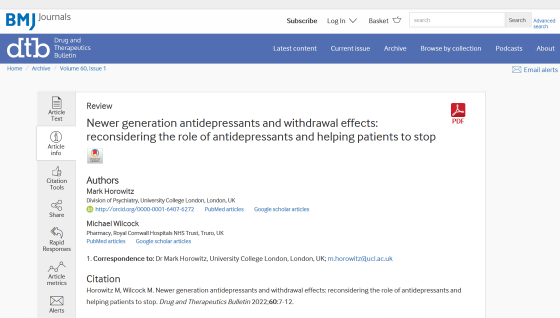'There are many disadvantages to antidepressants, and doctors should reduce the amount and duration of prescription,' researchers argue.

Newer generation antidepressants and withdrawal effects: reconsidering the role of antidepressants and helping patients to stop | Drug and Therapeutics Bulletin
https://dtb.bmj.com/content/60/1/7.info

We May Be Prescribing Antidepressants Wrong, Claims Concerning New Review
https://www.sciencealert.com/we-might-be-using-antidepressants-incorrectly-says-concerning-review-of-the-data
Antidepressants are often prescribed for people with depression, but Dr. Mark Horowitz, a psychiatrist at University College London , and Michael, a pharmacist at Royal Cornwall Hospital. 'There remains considerable short-term and long-term uncertainty about the effects of antidepressants, especially the clinical differences between antidepressant and placebo treatments,' Wilcock said. There is a lack of it, 'he said, arguing that the prescription of antidepressants needs to be reconsidered, with a balance between advantages and disadvantages.
Horowitz and colleagues conducted a systematic review of past studies and found that 'most clinical trials investigating the effects of antidepressants are only effective for a relatively short period of 6-12 weeks. 'I haven't done it,' he points out. In reality, many depressed patients take antidepressants every few months to several years, so clinical trials do not match the actual situation of antidepressant prescriptions.
A further concern is that most studies only look at the symptoms of depression and do not look at the most important 'quality of life.' In a paper, the research team said, ' Approximately 20% of patients taking selective serotonin reuptake inhibitors (SSRIs) , which are common antidepressants (such as Paxil and Luvox ), have daytime sleepiness and oral cavity. It reports thirst, heavy sweating, weight gain, etc. About 25% report sexual dysfunction, about 10% report irritation, muscle cramps and twitching, nausea, constipation, diarrhea, dizziness, etc. I am reporting. ' In addition, a study analyzing self-assessment of side effects by long-term antidepressant users found that 71% had emotional paralysis, 70% had a mist or isolation of thought, and 66% had sexual dysfunction. , 63% reported side effects such as drowsiness.
Another issue that the research team focused on was that 'long-term use of antidepressants often begins in teens.' Antidepressant is effective for teens clinical evidence is little but, in reality antidepressants adolescent girls is one of the drugs that are most often taking has become, antidepressants The number of children aged 12 to 17 who are prescribed for depression is increasing rapidly in each country.

A 2017
In response, the National Institute for Health and Care Technology states that a difference of at least 3 points is needed to make a clinical difference, and another study claims a difference of 7 points. In other words, the difference of 2 points produced by modern antidepressants is not sufficient.
The research team is also investigating withdrawal symptoms that occur when you stop taking antidepressants. Guidance issued by the Royal Society of Psychiatry in the United Kingdom states that patients who stop taking antidepressants may experience withdrawal symptoms such as headache, anxiety, insomnia, agitation, fatigue and diarrhea.
The researchers point out that withdrawal symptoms from antidepressants are more common than previously recognized, and there is widespread recognition that they are longer and more severe. It is necessary to gradually reduce the dose to avoid withdrawal symptoms, but even if the dose is gradually reduced, there is no guarantee that long-term withdrawal symptoms can be avoided. The research team also pointed out that if the antidepressant dose is too high, it is difficult to gradually reduce the dose.

It is not possible to stop prescribing antidepressants immediately after the results of this study, and more research is needed to make the final decision. However, the research team said that there is increasing evidence that aggressive prescribing of antidepressants in each country has disadvantages, 'recognizing that some patients are suffering from quitting antidepressants. The increase should lead to prudent prescribing practices that reduce the number of patients who prescribe more antidepressants and the duration of their dosing. '
Related Posts:
in Science, Posted by log1h_ik







